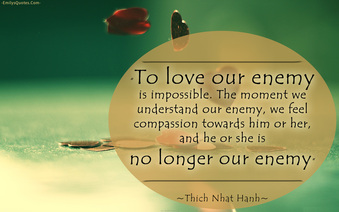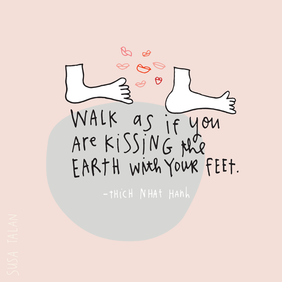|
Thich Nhat Hanh has been a great inspiration for millions of people across the globe. His rich publications, inspirational quotes, and his healing presence have all been important reminders for all. He has directed us on the path to finding ourselves: He has taught us to love again through the shadows of hate. And he has given us reason to say two powerful words: Thank you. Unfortunately, these two words are routinely (and often weakly) uttered after we have decades of practice. Fortunately though, there are many opportunities that exist each day to emphatically share these two powerful words. Not with the intention to change someone's life, but rather to take a moment in their life and yours to stop, look at them eye to eye, place a hand on their shoulder, and firmly say "Thank you." By doing so, we assuredly recognize the other person for who he/she is and the value he/she has in our life. Acknowledgement of another human being raises awareness of the undeniable connection and relationship we all have with each other. Beyond acknowledging another human being, we can express our gratitude to the earth beneath our feet and to the heavenly space above us. Both of which provide us with everything we need in every moment of our life. A study found in the NIH library states that "An existing body of research supports an association between gratitude and an overall sense of well being...". Sharing gratitude is an important step to a healthier you, a stronger community, and any loving relationship. Never forget the power of these two words when expressed with full intention. And just as important, never forget how to accept this acknowledgment for yourself, for when you thank another person, you are in fact thanking yourself for the very same reason. I thank you for reading. Take a moment this coming Thanksgiving Holiday to practice sharing these two powerful words with someone in your life. With sincerest gratitude,
0 Comments
 I have one question for you. What would your life be like without any stress? Can you even imagine it? Would you know how to live without it? Would you eventually want it back? Now, I'm not pretending that I know what "stress" is for you. In fact, I don't believe the word "stress" is an accurate description of what anyone claims it to actually be. In my experience, we simply use this word as a label, like we do with many others, because we are unable to describe what it is we are actually experiencing when the things we call "stressors" appear in our lives. Sure, you cannot control certain situations, such as when someone comes to your desk asking for your assistance with a task when you're already buried in work. What you CAN do is manage the situation by observing your response. Observe what happens in you physically: Does your breathing increase in frequency? Does your heart start to pump faster? Do you hold your tongue and prevent yourself from saying what you REALLY want to say? Isn't it interesting how our decisions and our reactions/responses change our bodies' physiology in an instant? Also, did you know that the chemical response of generating an emotion lasts approximately for 90 seconds only? Interesting, considering the stories that go on in our heads easily continue for MUCH LONGER than 90 seconds. (Perhaps we should all call ourselves great storytellers like Bill Cosby.) But seriously though, after 90 seconds of listening to your co-worker ask for your assistance and you then responding to his or her request, do you often find yourself hung up on the situation repeating it in your head, or making stories up about this person never doing any work and always passing it off onto others? If so, you're digging your own grave at a very rapid and emotionally-charged pace. By learning to manage your reactions/responses in simple situations such as these, it is quite possible that you may never even reach the 90 second point. Awareness of your emotions is the key to the door for managing stress. Observe what happens inside of you during similar situations. Do the same things always appear? Does your breathing always rise up into your chest and occur more frequently? Do you clench your jaw automatically? Does your face always blush? If you picked apart each physiological response that happened in these situations and pondered about them, I'm certain you could come up with a way to limit the length of its presence in the moment, and perhaps for good.
Understanding what happens inside of your body and how it manifests on the outside will determine your ability to live with or without "stress". So, the next time you encounter what you consider to be a "stressful" situation, keep your senses open. After the situation passes, reflect upon what just happened and understand why your body did what it did. Do this and the relationship you have with your body will strengthen, and who knows, maybe even your relationship with others will as well. Peacefully, Each day as I stand on the metro commuting to and from work, I am privy to some of the most interesting, outrageous, and often repulsive conversations that would make even the NSA want to stop listening in. Recently, while hearing the nitty-gritty details on someone’s view of their acquaintance at work, I found myself reaching deep into my pocket for my earphones faster than you could say “Is this my stop yet?” After I quickly and carefully placed them into my ears and cranked up the volume on whatever Pandora channel I could select the fastest, I found myself contemplating the impact of the words we choose to use in our conversations.
It was Rudyard Kipling who said, “Words are, of course, the most powerful drug used by mankind.” How true this is when we think of how far our words actually reach. Speaking our words into the ether that fills the space around us and leaving them to the wind of our breath to be carried contagiously to the tongue of the next vulnerable open mouth only to be spit back out like a venomous vapor unknowingly contaminating those around us, dead or alive. This leads me to several small and big-picture questions to which we can take a closer look. When I am speaking… 1. Do I think before I speak? 2. Do I take into full consideration the person I am speaking about? 3. Do I realize the true meaning of my words? 4. Am I imagining how others will translate and spread my words and the atmosphere I create? And most of all… 5. Do I think of (and honor) my elders when I am speaking? Let’s take a closer look at these five questions. Do I think before I speak? When someone says something that penetrates beneath your skin and draws closer and closer to your dignity as a human being, do you respond or do you react? What’s the difference, exactly? A reaction is simply your immediate and uninhibited reply to someone’s speaking or action. A response is, in essence, a controlled and well-orchestrated reaction. So, when you speak, are you reacting or are you taking the time to form an effective response? Yes, everyone should speak from his or her heart. But remember, even your heart pauses between beats to allow for graceful communication between itself and the organs with which it communicates so that you may stay alive. Do I take into full consideration the person I am speaking about? A friend recently reminded me of an old Chinese concept I often use to define my role as an Acupuncturist: “The person you are addressing hears what you have to say and also tries to hear what you are not saying.” When you listen to a conversation, do you only hear what is on the surface or do you also take into consideration the person being spoken about? This is like looking at the back of your hand but thinking about what the front of the hand looks like without turning it over. Now, imagine when you are speaking about a colleague at work who does not carry his or her own weight. Do you, before you speak, attempt to understand the possibilities of what may be occurring in his or her life or do you willfully jump to conclusions and rashly judge the person for what they have or have not done? Compassion is the key that will lock away the evils of judgment. Do I realize the true meaning of my words? I mostly mean this question in a quite literal sense. Have you ever considered the true meaning and etymological path of the words you use in everyday common language? Do the words you choose actually align with the description you are attempting to provide? I assert that a large majority of our words are misused as well as misplaced leaving our predecessors to wish THEY had earphones of their own (and an eclectic selection of Pandora channels). Just think of the wording used in the United States Constitution or the Declaration of Independence and then consider how many people you know speak as eloquent as our forefathers. In essence, we should be consciously choosing the words that accurately relay the message we wish to deliver in every conversation we engage in. Am I imagining how others will translate and spread my words and the atmosphere I create? Beyond my reactions and responses. Beyond keeping the other person respectfully in mind. And beyond the root of the words I choose, is the thought of where my words will travel to next. Not just in terms of gossip, but in terms of how open or closed my words are and what world they will create for the listeners. An example would be the difference between hearing a politician speak on civil rights versus hearing someone like Martin Luther King, Junior. A sense of possibility and profoundness is peacefully inserted into every spoken word in order for the listener’s mind to remain fully open and unobscured. So, speak as if you were changing the world…for good. Do I think of (and honor) my elders when I am speaking? I admit, this is not a usual question, but it certainly is a worthy one to ask. I am sure you can remember at least one grandparent who spoke carefully, openly, and meaningfully about those in their life. The words we use often are a mirror reflecting back to us the teachings we received throughout our youngest years of life and the lessons we have learned that carried through to the present. When speaking ill of someone, would your grandfather or grandmother approve? It reminds me of the common nutritional recommendation “If your grandmother can’t recognize it as food, it probably isn’t (something you should be eating).” The same is true for language. If your grandparents cannot recognize your words as being truthful and respectful, then you probably shouldn’t be saying them. To close, I implore you, the next conversation you take part in, to ask yourself these five questions. For your sake, the listener’s sake, and for the world around you once inhabited by your elders. Always ask yourself before speaking, do the words I’m about to voice carry the possibility of a new world that will serve myself, respect those around me, and honor my elders? Peacefully, |
Posted here are...inspirational ideas on healthy living through eastern medicine, optimism, and possibility through empowerment. Archives
March 2020
Categories
All
|
HOURS & LocationMondays-Thursdays 5:30-6:30pm (Tai Chi & Qigong only)
Fridays 5:00-6:00pm (Tai Chi & Qigong only) Saturdays 1:00-6:00pm (Acupuncture only) |
CONTACT Us |







 RSS Feed
RSS Feed



